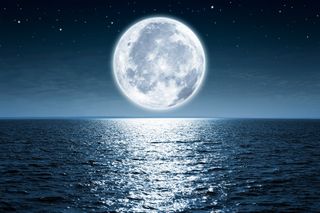As unlikely as it sounds, a recent study has linked restless sleep to the moon.

The full moon is a pretty sight to behold, but apparently
there’s more to the distant rock than just its ability to change the
tides on our planet. A study in the journal Current Biology has suggested that we humans are more prone to getting lower quality sleep during the time of full moons. In fact, the study has shown that we may very well snooze an average of 20 minutes less than we do during a new moon.
Say
what? Yeah, we’re pretty surprised about this new finding too. But lead
study author Christian Cajochen of the Psychiatric Hospital of the
University of Basel has given us some food for thought, saying: “If you ask people, at least in Switzerland, about 40% report feeling the moon during sleep, or they blame the full moon for bad sleep.” And it was this survey result that prompted Cajochen and his colleagues to investigate the intriguing phenomenon.
Results from the study
Under
strictly controlled conditions, 33 healthy volunteers aged between 20
and 74 were placed in a setting where there were no windows, so they had
no way of knowing the phase of the moon at the time of the experiment
(which lasted 3 and a half days). The results from the study were
intriguing:
- The full moon caused a 20-minute reduction of total sleep time.
- It would take the subjects about 5 minutes longer to fall asleep around the time of a full moon compared to a new moon.
- The duration of deep sleep was reduced by about 30% around the time of a full moon.
- Those
who slept around the time of a full moon had lower evening levels of
the hormone melatonin, which is responsible for stabilising the body’s
circadian rhythm.
That said, due to the small
number of participants in this study, it is hard to say if the results
are applicable to the rest of the population. However, I’m sure we’ve
all heard stories from staff working the night shift at hospitals that
the full moon does indeed play a big part in causing patients to act out
more than usual. Perhaps there is some truth to the moon affecting our
internal body clocks after all.

Коментари
Постави коментар